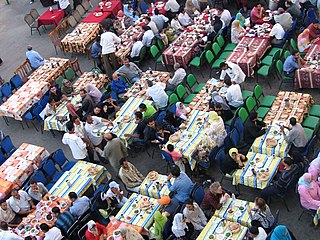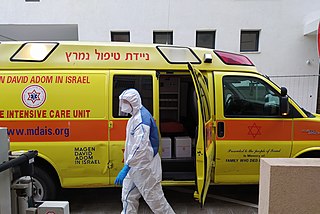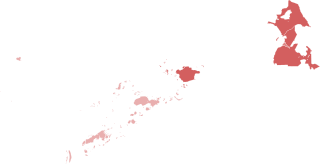Related Research Articles

Tablighi Jamaat is an Islamic missionary movement that focuses on exhorting Muslims and encouraging fellow members to return to practising their religion as it was practised during the lifetime of the Islamic prophet Muhammad, and particularly in matters of ritual, dress and personal behaviour. The organisation is estimated to have between 12 million to 80 million adherents worldwide, with the majority living in South Asia, and a presence in somewhere between 180 and 200 countries. It has been deemed as one of the most influential religious movements in 20th-century Islam.

Iftar, also known as fatoor, is the evening meal with which Muslims end their daily Ramadan fast at sunset. They break their fast at the time of the call to prayer for the evening prayer. This is their second meal of the day; the daily fast during Ramadan begins immediately after the pre-dawn meal of suhur and continues during the daylight hours, ending with sunset with the evening meal of iftar.

Jeeto Pakistan is a Pakistani game show, hosted by actor Fahad Mustafa on ARY Digital. The show was launched on 18 May 2014. It has been called the "biggest game show" of Pakistan. Jeeto Pakistan's participants are selected randomly from a studio audience, who require passes to attend the show.

The ongoing pandemic of coronavirus disease 2019, a novel infectious disease caused by severe acute respiratory syndrome coronavirus 2, spread to the United States in January 2020. The first U.S. case was identified on January 20, in a man who had returned from Wuhan, China to Snohomish County, Washington on January 15. The first report of a U.S. death came on February 29. An earlier U.S. death, on February 6, was determined in late April, and is believed to be community transmission. By the end of March, cases had occurred in all 50 U.S. states, the District of Columbia, and all inhabited U.S. territories except American Samoa. By April 11, the federal government approved disaster declarations for all states and inhabited territories except American Samoa. As of April 24, the U.S. death rate was 152 per million people, the tenth highest rate globally.

The first case of the 2019–20 coronavirus pandemic in Israel was confirmed on 21 February 2020, after a female citizen tested positive for coronavirus disease 2019 at the Sheba Medical Center after return from quarantine on the Diamond Princess ship in Japan. As a result, a 14-day home isolation rule was instituted for anyone who had visited South Korea or Japan, and a ban was placed on non-residents and non-citizens who were in South Korea for 14 days before their arrival.
The 2020 coronavirus pandemic in Sri Lanka is an ongoing viral pandemic of coronavirus disease 2019 (COVID-19), a novel infectious disease caused by severe acute respiratory syndrome coronavirus 2 (SARS-CoV-2). As of 28 April 2020, 611 confirmed cases have been reported in the country with 7 deaths. On 3 March 2020, the first reported case involving a Sri Lankan origin outside Sri Lanka was reported in Italy. As of 23 March, forty-five quarantine centers have been built in the country by the Sri Lanka Army as a preventive measure to tackle the coronavirus pandemic. Nearly 3,500 people have been under quarantine in 45 quarantine centers which also include 31 foreigners from 14 countries.

The 2019–20 coronavirus pandemic was confirmed to have reached Pakistan on 26 February 2020, when a student in Karachi tested positive upon returning from Iran. By 18 March, cases had been registered in all four provinces, the two autonomous territories, and the federal territory of Islamabad.

The 2019–20 coronavirus pandemic was confirmed to have reached Albania on 8 March 2020, a father and son who had travelled from Florence, Italy.As of 26 April 2020, there are 726 confirmed cases of COVID-19 in Albania.

The 2019–20 coronavirus pandemic was confirmed to have spread to Brunei when its first case was confirmed in Tutong on 9 March 2020. Many early cases were linked to Jamek Mosque Sri Petaling in Kuala Lumpur, which held a large Tablighi Jamaat ijtema event at the end of February 2020. Of Brunei's first 50 cases, 45 were related to Jamek Mosque. The pandemic had spread to all districts of Brunei, except in the exclave of Temburong.
This article documents the timeline of the 2020 coronavirus pandemic in Pakistan.

The 2019–20 coronavirus pandemic has impacted religion in various ways, including the cancellation of the worship services of various faiths, the closure of Sunday Schools, as well as the cancellation of pilgrimages surrounding observances and festivals. Many churches, synagogues, mosques, and temples have offered worship through livestream amidst the pandemic. Relief wings of religious organisations have dispatched disinfection supplies, powered air-purifying respirators, face shields, gloves, coronavirus nucleic acid detection reagents, ventilators, patient monitors, syringe pumps, infusion pumps, and food to affected areas. Other churches have offered free COVID-19 testing to the public. Adherents of many religions have gathered together to pray for an end to the COVID-19 pandemic, for those affected by it, as well as for wisdom for physicians and scientists to combat the disease. In the United States, President Donald Trump designated 15 March 2020 as a National Day of Prayer for "God's healing hand to be placed on the people of our Nation".
On March 15, 2020, during a video conference of the SAARC Heads of State and Government, Indian Prime Minister Narendra Modi proposed a Coronavirus Emergency Fund. This emergency fund was set up in response to the global coronavirus pandemic. The initiative seeks to mitigate the risks associated with the coronavirus pandemic in the South Asian region. The other members of the SAARC expressed their support of Narendra Modi and his proposal for the coronavirus emergency fund.

Countries and territories in South Asia have been affected by the 2019–20 coronavirus pandemic.

This article documents the chronology of the response to the 2019–20 coronavirus pandemic in April 2020, which originated in Wuhan, China in December 2019. Some developments may become known or fully understood only in retrospect. Reporting on this outbreak began in December 2019.
There are no confirmed coronavirus disease 2019 cases in Tajikistan. An article in The Diplomat raised questions about Tajikistan's lack of reported coronavirus cases.
A Tablighi Jamaat religious congregation that took place in Lahore's Raiwind Markaz in early March 2020 was a coronavirus super-spreader event with more than 539 confirmed cases linked to the event being reported across the country. Science and Technology Minister Fawad Chaudhry blamed the "stubbornness of the clergy" for the event having gone ahead despite the worsening coronavirus pandemic.
This article is a summary of the social distancing measures related to the 2019-20 coronavirus pandemic.
Sani Yahaya Jingir is an Islamic cleric scholar, living in Plateau State, He is the National Chairman Council of Ulama, Jama’atu Izalatil Bid’ah Wa’Ikamatis Sunnah (JIBWIS) under Jos. On May 25, 2015 he was elected chairman of the council when a decision is made after a council meeting in Jos, made by the Ulama’u's elders Council, while Sheikh Alhassan Saed Adam to be the second chairman, the election was made when the council lost its chairman Sheikh Zakariyya Balarabe Dawud.

Wikipedia experienced an increase in readership during the 2019–20 coronavirus pandemic. Editors have worked to remove disinformation and misinformation. According to the newspaper Dawn, since reports of cases in Wuhan emerged in December 2019, Wikipedia editors have averaged 163 edits per hour. There are approximately 4,500 Wikipedia pages related to the pandemic, as of 23 April 2020.

The 2019–20 coronavirus pandemic was confirmed to have spread to the Bangsamoro Autonomous Region in Muslim Mindanao of the Philippines on March 11, 2020, when the first case of coronavirus disease 2019 (COVID-19) was confirmed to involve a resident of Lanao del Sur. Cases has been confirmed in Lanao del Sur, Maguindanao, and the independent city of Cotabato.
References
- ↑ Dawn.com, Javed Hussain | (2020-04-18). "President Alvi outlines plan agreed with ulema on congregational prayers during Ramazan". DAWN.COM. Retrieved 2020-04-27.
- ↑ Jamal, Umair. "Amid COVID–19, Pakistan Launches an 'Islam Friendly' Action Plan to Keep Mosques Open". thediplomat.com. Retrieved 2020-04-27.
| This article about COVID-19 is a stub. You can help Wikipedia by expanding it. |
| This Pakistan-related article is a stub. You can help Wikipedia by expanding it. |